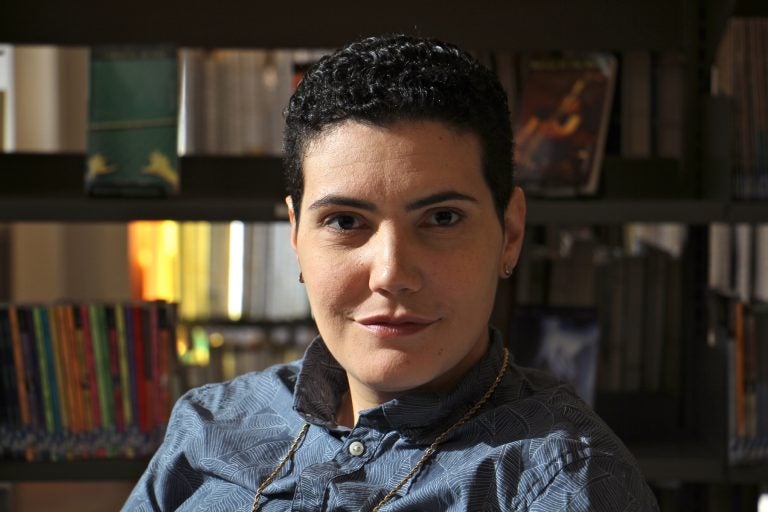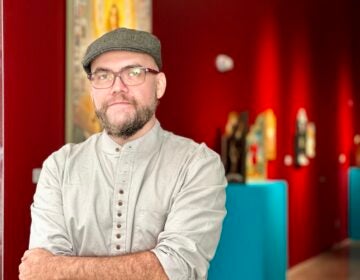Philly poet laureate writes verse on Puerto Rican debt
Philadelphia poet laureate, Raquel Salas Rivera, publishes book-length poetry cycle on Puerto Rican debt crisis.
Listen 6:23
Philadelphia's poet laureate Raquel Salas Rivera. (Emma Lee/WHYY)
Raquel Salas Rivera was just 16 when they first read Karl Marx’s “Das Capital” — as they write — “organically.”
Rivera’s book-length serialized poem, “The Tertiary,” describes being 18 years old and being swept along by revolutionary fervor: “i entered higher stages.”
i dreamt the cops burned my socks
in a bonfire and my marrows carried poisons.
if they broke a bone, they’d assure my death.
Rivera, Philadelphia’s poet laureate, was born and raised in Puerto Rico and prefers to be referred to with the gender-neutral pronoun “they.” They wrote the cycle of poems that makes up “The Tertiary” (“Lo Terciario,” Timeless, Infinite Light, 2018) immediately before, during, and after Congress passed a measure in 2016 that gave control of the U.S. territory’s finances and crushing debt to an appointed board.
“I was trying to re-create what it was like for me to see my island be torn apart by this bill and by the devaluation of bonds,” said Rivera.
The austerity measures imposed by the control board hit residents hard, particularly younger adults, who had to work for a minimum wage of $4.25 an hour. They are friends and creative colleagues of Rivera, currently a graduate student at the University of Pennsylvania.
Rivera writes about people they know, people known only through news reports (such as Jason Benner, the CEO of a software company, who was lured to the island by its cheap real estate and generous tax incentives), memories of their cocolos parents, native golden coqui frogs and ceiba cotton trees, and dreams.
i dreamt the cia invaded my house
with open arms.
in their hands they had bloody cotton balls,
and said: your mother is dead.
but the cia never came, only bills and bills.
Nearly every page references debt. Rivera structured the cycle into three segments, named after Marxist economic ideas: “The Debt-Production Process,” “The Debt-Circulation Process,” and “Notes on a Derailed Circulation.”
Individual poems are not titled, rather introduced with a quote from Marx: for example, “the conversion of a sum of money into a sum of commodities.”
“Part of it is a joke,” said Rivera. “It’s half really serious, because it’s about very painful and very devastating things that are a product of capitalism.
“But on the other hand, I think Marx’s language is really macho and distancing and withholding,” they said. “That’s who Marx was. I mean, Marx wasn’t a trans person or — as far as I know — queer. He was a white, European man. I really wanted to tease out what this language had meant in my own life, this way of talking about the world.”
Rivera takes shots at Marxist ideology, even while embracing its goals. But being a poet inside a Marxist revolution — trying to subject the dominant capitalist system — is itself subversive. Art that is not in service of revolution is frowned upon.
Rivera envisions a brighter future for their beloved Puerto Rico, and champions its margins, the queers and misfits outcast by their families: “after orlando, they never called us.”
Rivera tried to keep their poetry separate from the work they do as poet laureate of Philadelphia, a civic position requiring the poet to promote literacy and expression among the city’s citizenry. Nevertheless, the ideals cross over.
“I would like to think that the work I’m doing in Philadelphia is creating the space for people to speak from their differences, and for us, hopefully, to hear those differences,” they said. “Listening can be a radical act, to be able to listen and hold that difference.”
Rivera will host a book release event on May 7 at Tatooed Mom on South Street.
To hear WHYY’s full interview with Raquel Salas Rivera, listen to the audio above.
WHYY is your source for fact-based, in-depth journalism and information. As a nonprofit organization, we rely on financial support from readers like you. Please give today.





